This month’s Six Degrees has come around again already. Hosted every month by Kate at books are my favourite and best, we each begin with the same starter book and link a further six books to make a chain. Each book only needs to link to the one immediately before it though invariably my books link together in more ways than one. I never have any idea where my chain will lead me and am frequently surprised when I reach the end to find links and themes that weren’t apparent to me as I went along. This month is no exception and indeed, has turned my Six Degrees into something more.
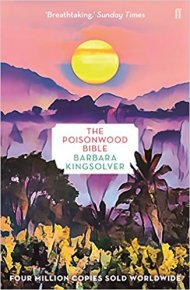 We begin this month with The Poisonwood Bible (1998) by Barbara Kingsolver, which could be awarded a prize for being the book I have most not wanted to read despite recommendations.
We begin this month with The Poisonwood Bible (1998) by Barbara Kingsolver, which could be awarded a prize for being the book I have most not wanted to read despite recommendations.
There was plenty of discussion about it after last month’s Six Degrees. It seems to generate strong opinions in general and certainly in the case of my daughter and me. Ellie loves this book and has often encouraged me to read it. For whatever reason I have not been drawn to it although it ought to be a book I’d enjoy. After the discussion from last month’s thread I thought maybe I might just give it another try. Maybe. More recent input has convinced me even more that I really must give it a try. So much so that it’s now on order from the library. But until it arrives it 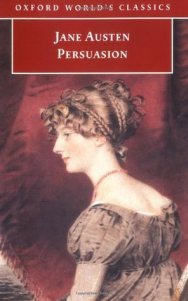 stands out as “the book that Ellie failed to convince me on”.
stands out as “the book that Ellie failed to convince me on”.
This leads me into my first choice for this month’s chain. Flipping the situation regarding The Poisonwood Bible, I in turn, have never managed to convince Ellie of the joys of Jane Austen. She’s tried; it hasn’t worked. So my first choice for May is Persuasion (1817) by Jane Austen. I chose Persuasion simply because it’s my favourite of her novels.
Reflecting on the books and authors that we perhaps never get to try because of some undefined prejudice led me to my next choice. An author I have long been unreasonably prejudiced against is Ian McEwan. The reasons are lost to history: perhaps I was forever put off by the disturbing opening scene from the film of his novel, Enduring Love. But things have changed. I never got passed that first scene in Enduring 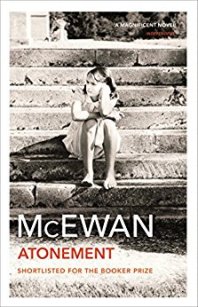 Love but I did watch in its entirity the film of another of his books when it was first released, and earlier this year I finally read Atonement (2001): a story within a story created by Bryony, the younger of two sisters in a wealthy family. Through the lens of the story she writes, Bryony looks back over the course of her life and the disastrous results of a single lie. Not only did I love the book, I was delighted by McEwan’s writing. I’ll pick carefully from his catalogue – avoiding Enduring Love for a start – but I will certainly read more of his books. Better late than never.
Love but I did watch in its entirity the film of another of his books when it was first released, and earlier this year I finally read Atonement (2001): a story within a story created by Bryony, the younger of two sisters in a wealthy family. Through the lens of the story she writes, Bryony looks back over the course of her life and the disastrous results of a single lie. Not only did I love the book, I was delighted by McEwan’s writing. I’ll pick carefully from his catalogue – avoiding Enduring Love for a start – but I will certainly read more of his books. Better late than never.
From Atonement to Brooklyn (2009), by the Irish novelist Colm Tóibín. The connection initially was very simple: I loved both novels; I’ve re-watched the film versions of both very recently. As with Atonement and McEwan, Brooklyn was the first of Tóibín’s novels that I’d read and it got me hooked. Oh, and I’m also continuing the run of one-word titles. (In both cases, for what it’s worth, I enjoyed the books more than the films. Both films were good, but it’s hard to beat an outstanding book.)
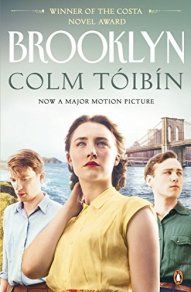 But there are other parallels. The opening chapters of Atonement describe the stifling life of Bryony and her elder sister in the thirties. Brooklyn begins in the fifties and tells the story of Eilis, a young woman trapped in a claustrophobic life in Ireland whose elder sister helps her towards a new life in America. Brooklyn is beautifully written: filled with tight, lyrical, understated prose. A quiet novel filled with tiny treasures.
But there are other parallels. The opening chapters of Atonement describe the stifling life of Bryony and her elder sister in the thirties. Brooklyn begins in the fifties and tells the story of Eilis, a young woman trapped in a claustrophobic life in Ireland whose elder sister helps her towards a new life in America. Brooklyn is beautifully written: filled with tight, lyrical, understated prose. A quiet novel filled with tiny treasures.
And it led me easily to another novel also by a renowned Irish author, also understated yet rich in poetic prose and also telling the story of a young woman’s flight from Ireland to America, leaving behind her older sisters. On Canaan’s Side (2011) by Sebastian Barry was my first encounter with Barry’s work and once again, I am hooked.
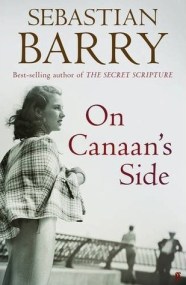 Where to from here? My thoughts were now firmly focused on family and on female lives in particular, and with Canaan and the Bible already featuring in two of the titles, it was a short leap to The Red Tent (1997) by Anita Diamant which offers a fictionalised life of Dinah, daughter of Jacob and sister of Joseph. The book tells the story of Dinah’s early life amongst the women of her family and her subsequent years in a far-flung country where she gains notoriety as a skilled midwife. And very neatly, this is a book which Ellie recommended to me and which we both enjoyed.
Where to from here? My thoughts were now firmly focused on family and on female lives in particular, and with Canaan and the Bible already featuring in two of the titles, it was a short leap to The Red Tent (1997) by Anita Diamant which offers a fictionalised life of Dinah, daughter of Jacob and sister of Joseph. The book tells the story of Dinah’s early life amongst the women of her family and her subsequent years in a far-flung country where she gains notoriety as a skilled midwife. And very neatly, this is a book which Ellie recommended to me and which we both enjoyed.
My chain has now moved from a difference of opinion between mother and daughter to consensus, and my final choice needed to keep us both on the same side but also link to the previous book with something more. Thus, I turn to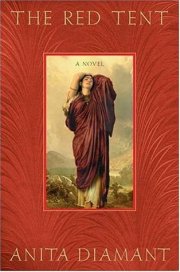 Anita Shreve – sadly recently deceased. An obvious connection with the previous book is the authors’ shared forename and Anita Shreve is also an author that Ellie and I both enjoyed, often sharing her books between us. Without thinking too much about it, I chose Fortune’s Rocks (1999) as my final link in the chain. Then I noted that, in common with Brooklyn, Atonement and On Canaan’s Side, it too, is a story of a young woman and the impact of a single event on the rest of her life, in this instance her affair with a much-older, and married, man in a small American town at the close of the nineteenth century.
Anita Shreve – sadly recently deceased. An obvious connection with the previous book is the authors’ shared forename and Anita Shreve is also an author that Ellie and I both enjoyed, often sharing her books between us. Without thinking too much about it, I chose Fortune’s Rocks (1999) as my final link in the chain. Then I noted that, in common with Brooklyn, Atonement and On Canaan’s Side, it too, is a story of a young woman and the impact of a single event on the rest of her life, in this instance her affair with a much-older, and married, man in a small American town at the close of the nineteenth century.
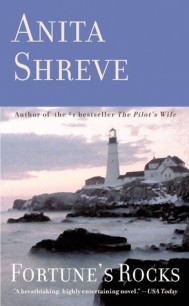 As I contemplate these choices I am struck by the recurring themes. Women feature throughout as mothers, daughters and sisters. There are flights to foreign climes and frequently the lives of these women have turned on a single far-reaching event. Only when I got to this point in putting my thoughts together did I remember that of course, The Poisonwood Bible is told by a woman and her daughters and is founded upon the momentous decision by her evangelist husband to move his family from their home in America to the Belgian Congo. A single event; a flight from one country to another.
As I contemplate these choices I am struck by the recurring themes. Women feature throughout as mothers, daughters and sisters. There are flights to foreign climes and frequently the lives of these women have turned on a single far-reaching event. Only when I got to this point in putting my thoughts together did I remember that of course, The Poisonwood Bible is told by a woman and her daughters and is founded upon the momentous decision by her evangelist husband to move his family from their home in America to the Belgian Congo. A single event; a flight from one country to another.
Only Anne in Persuasion, I mused, appears not to fit entirely with my collection of female protagonists. Then I remembered the event which occurs before the novel opens upon which the novel rests: when Anne is persuaded against her romance with Captain Wentworth. And I also remembered the piece in the excellent series currently running on Sarah Emsley’s blog about Persuasion and Northanger Abbey, which discusses what the future may hold for Anne. She may not have travelled so very far in the course of the novel itself – although she doesn’t do badly for an Austen heroine – but the stage has been set for her to become perhaps the most widely travelled of Austen’s heroines, following the role model of Mrs Croft in her capacity as the wife of a naval officer. Persuasion has more than earned its place in the chain.
This month’s ‘Six Degrees’ has turned into what I more normally write under the title, ‘Reading Rambles’. I haven’t produced one of those for some time. And in the spirit of a reading ramble, I have to add one final thought in regard to this chain, having just read one of the many excellent reviews by Claire on Word by Word. In the course of the review she addresses ‘the quiet novel’ and refers to a list suggested by Jenni Ogden of quiet novels – among which is The Poisonwood Bible. Whether that particular book belongs in such a list remains to be seen – now that I have at long last bitten the bullet and ordered it from the library I can judge it properly for myself. Perhaps – as with Atonement and Ian McEwan – I shall overcome years of unreasonable prejudice! In any event, I like how it brings my ramblings here full circle. And I shall certainly have a view on whether it fits the brief of a quiet novel, for I’ve been reading a number of them of late. Jenni Ogden’s article on the quiet novel has left me with plenty to think about. She has this to say:
“… I am acutely aware of the rhetoric around what makes a successful commercial novel. Don’t wander from the main story, tension on every page, get that inciting incident in early because if you don’t most readers will give up before they get to the end of the first chapter. I agree that suspense is important, even essential, in good stories, but suspense can be quiet and even peaceful. All it needs is a question in the reader’s mind; how is this going to get resolved? Quiet books can and often do have loud emotions, big questions, be set in terrible situations—war zones, refugee camps, a blizzard, a psychiatric hospital, a cancer ward, a dysfunctional family—and have periods of dramatic action, but they are woven through with contemplation and evocative descriptions of place and thoughts and connection.”
I can’t yet say whether The Poisonwood Bible is “woven through with contemplation and evocative descriptions of place and thoughts and connection”. But I can certainly say that it applies to all six books that have sprung from it in my chain. I think that must make me a big fan of the quiet novel.
Next month’s starting book is by Malcolm Gladwell and is called The Tipping Point. I have never heard of it. Should be interesting …

I feel partially responsible for your being browbeaten into The Poisonwood Bible. I’m worried now! As it happens, I was talking with friends the other day about Persuasion, so I’ll re-read that – though where is my copy? The Red Tent occupies the same place in my heart as The Poisonwood Bible used to, and still does in yours. I have a copy. So let’s see. And I do love Malcolm Gladwell’s books. And Atonement. And Brooklyn. Lots in common here!
LikeLiked by 1 person
Ha ha! I certainly don’t feel browbeaten… Worn down maybe! 😂 But not by you specifically 🤣 Seriously, I’m really intrigued by it now. I want to beat my self-imposed block about it. (And I bet I’ll love it when I do. Either way, it has the makings of an interesting blog post.)
We certainly do have plenty in common here. And you’ve heard of and enjoyed Malcolm Gladwell’s books. I shall have to read up a bit on him. But not just yet! 🙂
LikeLiked by 1 person
So much to do ….. etc. etc.
LikeLiked by 1 person
Ooops, forgot to add: how interesting that you feel as you do about The Red Tent. I did enjoy it but I can’t say that I loved it and I remember wondering about all the hype. Do let me know your thoughts if you get around to trying it.
LikeLiked by 1 person
Hmm. I’ve flicked through a few pages and am not raring to go. But I will try it.
LikeLiked by 1 person
A very interesting chain – and yes, I couldn’t agree more with you about Persuasion. I’ve had so many friends whose literary opinions I hold dear recommend The Red Tent to me, that I really have to try to track it down.
LikeLiked by 1 person
I enjoyed The Red Tent but it’s not a cherished favourite and I remember wondering about all the hype surrounding it. It’s an easy read should you come across it. I wonder how I would feel about it if I read it again now?
LikeLike
Another interesting chain. Persuasion and Atonement are two I have read. I have to say I didn’t enjoy Persuasion, read many years ago. Perhaps I’d appreciate it more now. I have admired but not enjoyed McEwan in the past, but agree with you about Atonement
LikeLiked by 1 person
…admired but not enjoyed McEwan … – a good description, Derrick. I shall try some more of his books but with caution. I couldn’t get on with Austen at all until these past few years when I have more time. Apart from Emma – who annoyed me too much to enabled me to enjoy the book – I now find all Jane’s books a pleasure.
LikeLiked by 1 person
I just feel that a writer should like at least some of his or her characters
LikeLiked by 1 person
Yes! That’s it exactly!
LikeLiked by 1 person
You are the first to have agreed about this 🙂
LikeLiked by 1 person
To be fair, I must read more from him before agreeing properly but I was struck by that whilst reading Atonement certainly. I got no impression that he liked his characters: he stood so far back as to be almost completely detached from events and characters alike. Which of course, made the book itself even more impressive in that I did get utterly pulled into it. But I never felt that the writer himself engaged.
LikeLike
I love this reading ramble or six degrees in the way you have presented it, it describes how my reading intentions often flow, I’m not one to plan ahead, I like to see what one book provokes in me or somehow suggests, that sometimes leads on to the next, which wasn’t what I originally intended.
I love the quote you pulled from Jenni’s article, I hope she visits and sees how her words have had on impact on blog post today! And the different perceptions of what the quiet novel is. I’m enjoying the recommendations, especially when they happen to be books already on my shelf.
I’ve never really indulged Jane Austen and I’m not sure what it is that holds me back, I think it’s my perception of them holding the institution of marriage as a womanly ambition, rather than the pursuit of finding their true authentic selves, it might be why I steer away from the classics, although I loved reading Colette last summer, I like the slightly rebellious, independent nature of her protagonist (and herself).
The Poisonwood Bible and “evocative”, well, yes, it does mean bringing strong images, memories, or feelings to mind, not necessarily pleasant though! Bonne Courage!
LikeLiked by 1 person
Oh Claire, now I’m scared! 😱 And even more intrigued by The Poisonwood Bible. I really need to read it if only to get it off my radar. (I suspect it will stick fast though; I’m just not sure yet on the reasons why!)
Your thoughts re Austen and the classics in general are very interesting and leave me with much food for thought. I can feel a whole new reading ramble coming on!
I hope Jenni picks up on the quiet novel issue too. I’ve subscribed to her now: thanks for introducing me 🙂
LikeLike
There are so many books I love in this post. Persuasion, obviously, and The Red Tent and The Poisonwood Bible, and I also loved hearing echoes of Austen in both Atonement and Brooklyn. I thought of Eilis as Fanny Price — but now that you’ve made the connection with Elisabeth’s piece on Austen and adventure, I can see her as Anne Elliot.
LikeLiked by 1 person
You’ve got me thinking, Sarah. I think I agree more with your initial comparison of Eilis and Fanny. Eilis had very little choice about what happened in her life: so much was decided for her – ‘in her best interests’. I don’t know if you’ve read “On Canaan’s Side”. (I do recommend it, if not.) Lilly, the protagonist, reminds me more of Anne – or of a possible future Anne. Lilly is required to follow the man who will become her husband and does so willingly out of love and loyalty. When she finds herself alone in America (through no fault of her husband) she shows resilience, humility and dignity and wonderful humanity. Were Anne to find herself in similar circumstances, I can imagine her demonstrating those same attributes.
LikeLiked by 1 person
I haven’t read it — thanks for the recommendation!
LikeLiked by 1 person
Oh, this is definitely spooky, Sandra! I nearly put Atonement in my chain. It’s another book I love and one I bought to read on holiday (like The Poisonwood Bible and Fortune’s Rocks!). I’ve watched the films of both The Poisonwood Bible and Brooklyn and agree the books are better, although I enjoyed the films too.
I haven’t read On Canaan’s Side, but I have read Barry’s The Secret Scripture and Days Without End, both great books that had me glued to the pages. Now Jane Austen, need I say I love her books, maybe Persuasion isn’t my favourite because it was one of my A Level books and I didn’t enjoy analysing it so much. But I re-read it a few years ago and loved it more than I did at school. I haven’t read The Red Tent though …
I do hope you enjoy The Poisonwood Bible, but at least I’m not the only one who is recommending it, so I shan’t feel too bad it you don’t.
LikeLiked by 1 person
Gosh, Margaret – of all the books in the world we have such an overlap this month! Don’t feel bad about The Poisonwood Bible! I feel like it’s become a real cause celebre now! I’m looking forward to finally having a proper opinion of the book!
I do find it sad that many of us are negatively impacted by books we study in education. I was turned strongly against Shakespeare and Dickens! The backbone of English literature gone! It’s taken me years to pick up the threads and see through new eyes. I also came late to Austen, though not as a result of school. I could probably have one of her books permanently on the go at any time. And possibly my ‘favourite’ would change as I read: there is so much to appreciate with each fresh reading.
I do recommend On Canaan’s Side. A gem. It’s my only Barry so far but I’ll definitely be reading more. Several of his novels feature people from the same family albeit over different generations. (I think possibly mined from his own family tree but I may be wrong.) I’m fascinated with how that works as I know the novels aren’t written as a saga.
LikeLike
This is a brilliant list – all very much up my street! Persuasion is my favourite Austen as well. I really like Ian McEwan’s writing – I can recommend The Children Act as a skilful and highly engaging read. Sebastian Barry is an author to whom I have come relatively recently but I now adore his work. I was in the audience for a recording of World Book Club last summer, when he talked about The Secret Scripture – Barry was absolutely brilliant and it is worth a listen if you have not heard it already – see https://www.bbc.co.uk/programmes/w3csv2bn Meanwhile, Anita Shreve is another writer who I love – good choice with Fortune’s Rocks. So on this basis, I had better add The Red Tent, Brooklyn and On Canaan’s Side to my TBR!! 🙂
LikeLiked by 1 person
Ha ha, Liz it’s a problem with this six degrees thing – I end up with so many more books to read! Thank you so much for the Barry link. I’ll look forward to that later and I’m really keen to read more from him. I certainly recommend On Canaan’s Side. It seems to be one of the few of his books which hasn’t won a prize. On that basis, his others must be staggeringly good! And definitely consider Brooklyn – the best of Toibin that I’ve read to date.
Thank you for recommending The Children Act. I suspect it may have slipped through the net otherwise. I had been thinking I might try On Chesil Beach, so that gives me two to sample. (Some of his others are definitely not my cup of tea!)
LikeLiked by 1 person
Well yours are definitely on my list! I hope you enjoy The Children Act. On Chesil Beach is good too. I agree with you about having mixed feelings about his work. I read Nutshell a while ago and, while I could see the skill behind the writing (it is a re-telling of Hamlet), I could not warm to it. But we can’t all like everything all the time, can we!!
LikeLiked by 1 person
Thankfully not! Imagine all those books that would be clamouring to join my already long list of books in waiting! 😀
LikeLiked by 1 person
lol – I dread to think…!! 😂
LikeLike
Enjoyed your ramble! Some great books on there that I’ve read – Persuasion, Atonement, Brooklyn – and some others I haven’t but would like to. I also haven’t read The Poisonwood Bible yet, but it’s been sitting on my Kindle since 2015, so it must be getting near the top, surely. And another blogger was trying to talk me into On Canaan’s Side just the other day, so perhaps fate is calling me on that one…
LikeLiked by 1 person
I’m taking a guess here: I don’t think On Canaan’s Side is your type of book 😐 On the other hand, if you enjoyed Brooklyn you’d probably enjoy On Canaan’s Side. Either way, I know you’d appreciate the writing. (Definitely a ‘quiet novel’, however one cares to define that.) Will we seeing a Six Degrees from you this month, FF? 🙂
LikeLike
Really? Now I’m deeply intrigued! Reverse psychology – you’ve made me want to read it even more now! 😉 You will – tomorrow maybe…
LikeLiked by 1 person
Ha ha – I shall scrutinize your posts and widgets for signs on that book now! 😀 And yes – an email just dropped into my inbox. Something to look forward to later. Right now, I really must … make the bed, tidy up, sort the laundry…. blah blah 😖 There again – surely it’s coffee time by now? Hurrah – time for a break then! 🤣🤣🤣🤣🤣
LikeLiked by 1 person
What a wonderful chain, Sandra. Persuasion is my favourite Jane Austen novel too. I also loved On Canaan’s Side – Sebastian Barry’s writing is always beautiful. If you want to read more of his books, I can highly recommend The Secret Scripture.
LikeLiked by 1 person
Helen, I think that will be my next Barry. I’m looking forward to it very much 🙂
LikeLike
I’m very hit & miss with McEwan, but it was Enduring Love that got me in in the first place – that shocking opening sequence had me mesmerised, aghast, on tenterhooks. I completely forgot where I was. But Atonement is my favourite.
Persuasion is also my fav Austen & like you I’ve avoided The Poisonwood Bible. But unlike you, I don’t think I will try again – twice is enough chances for a book, when there are so many others that hook me in from the first page.
LikeLiked by 1 person
Isn’t it great how different we all are! But we agree on Atonement and Persuasion – quality works 🙂
LikeLike
I love the premise for your chain. Of the books that have been highly recommended but that I have no desire to read, the top of my list is Harry Potter (don’t faint!). I’m actually sick of people exclaiming “You haven’t read Harry Potter!”. My response now is “Nope. I’m not into wizards.”
LikeLiked by 1 person
And I too, have never read a Harry Potter! You are not alone 😉
LikeLiked by 1 person
Phew! I have a friend.
LikeLiked by 1 person
I love both the The Poisonwood Bible and Persuasion! I remember sitting up until 3 am a few years ago because I simply could not put The Poisonwood Bible, down. Persuasion is a quieter pleasure, but just as gripping!
LikeLiked by 1 person
I’m hoping I will feel the same when I finish Poisonwood, Nicola 🙂
LikeLike